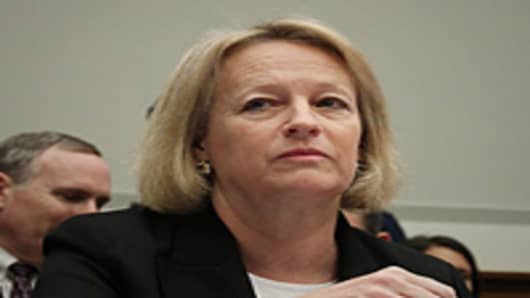Ms. Schapiro’s comments are the most direct signal yet that the S.E.C. is continuing to press for accountability and restitution for the upheaval in financial and housing markets in 2007 and 2008, which led to the sweeping regulatory bill that President Obama is scheduled to sign on Wednesday.
Officials at the Justice Department and other members of the Financial Fraud Enforcement Task Force, including the S.E.C., have said they are continuing to share information and to pursue other investigations into financial sector firms with questionable practices that came to light during the financial crisis.
The S.E.C. has drawn particular criticism from Congress, investor groups and other quarters for a lack of prominent enforcement cases against firms that played a major role in the financial crisis, which cost individual and institutional investors billions of dollars in losses.
Ms. Schapiro defended the commission’s record on Tuesday, telling members of a House Financial Services subcommittee that the agency’s enforcement division had been restructured and reinvigorated since she took over in January 2009.
Responding to questions from reporters after the hearing, Ms. Schapiro said the agency was looking beyond Goldman Sachs and that investors had “not necessarily” seen the bulk of cases that might stem from the financial crisis.
“We have investigations in the pipeline across products, across institutions coming out of the financial crisis,” she said. “We’ve brought a number of them. Nobody ever wants to pay attention to the ones we’ve already brought. But we’ve brought quite a few already coming out of the crisis over the last year and a half.”
In recent months, she told the committee, the S.E.C. has brought cases claiming accounting and disclosure violations at subprime lenders, misrepresentation of complex mortgage securities as safe investments appropriate for retail investors and misleading statements to investors about a fund’s exposure to subprime investments.
For example, last month the commission charged ICP Asset Management of New York with fraud and conflicts of interest related to its management of multiple C.D.O.’s and an affiliated hedge fund in 2007. The company denied the charges.
In February, the commission settled a case with State Street Bank and Trust of Boston in which the S.E.C. charged that the company misled investors about their exposure to subprime investments while selectively disclosing more complete information to certain favored clients. State Street paid $313 million to settle the case.
But the S.E.C. has not brought any cases against credit rating agencies related to the financial crisis, although those companies provided investment-grade ratings to many packaged mortgage investments that quickly turned out to be based on questionable loans to unqualified borrowers.
S.E.C. officials say they are continuing to investigate the credit rating agencies. But the Credit Rating Agency Reform Act of 2006 prohibits the S.E.C. from regulating the substance, criteria or methodologies used in credit rating models, making those inquiries more difficult.
On Tuesday, some members of Congress expressed eagerness for the S.E.C. to follow up its case against Goldman Sachs with other actions.
“I, for one, am hopeful that this legal action will be the first, and not the last, brought by the commission against the hucksters of Wall Street who spun toxic mortgages into golden financial opportunities by hiding information or defrauding investors by other means,” said Representative Paul E. Kanjorski, Democrat of Pennsylvania, who is chairman of the capital markets subcommittee.
The S.E.C. has only civil authority; the Goldman case was referred to the Justice Department for possible criminal proceedings. While Justice officials have said that a criminal investigation is continuing, they have also noted the difficulty of bringing such cases and have sought to dampen any expectations that charges could be imminent.
That difficulty was exhibited last year, when the Justice Department charged two Bear Stearns hedge fund managers with lying to investors about the precarious state of investments they oversaw. A federal court jury in Brooklyn found the two managers not guilty, saying essentially that while the managers made bad investments, that itself was not a crime.
The setback has not stopped further prosecutions, however. Last month, the former chairman of a lending company, the Taylor, Bean & Whitaker Mortgage Corporation of Florida, was indicted for his role in what the government said was a $1.9 billion fraud scheme that led to the collapse of Colonial Bank of Alabama, one of the 50 largest banks in the United States. The former chairman, Lee B. Farkas, pleaded not guilty.
Charlie Savage contributed reporting.


